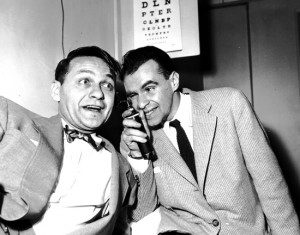
Earlier this fall, I challenged students in my college History of Broadcasting course. I asked them to find elderly residents in the GTA to talk about their memories of what is known as “the golden age of radio.” Not surprisingly, some of them went to seniors’ residences to find their sources. Others called on grandparents who had grown up in the 1930s and ’40s to recall the radio broadcasts that shaped their childhood. What I didn’t expect was a history lesson back from my own students. One group played a recording of their interview with an immigrant woman who was 90 years old.
“When I was a girl of 17 in Afghanistan,” the woman on the recording said, “I was never allowed to listen to the radio. It was something only men could hear.”
I was dumbstruck. I couldn’t believe what my students had found. Here was a woman, now living in Canada as a senior, with no childhood recollection of the sound of radio. While other similarly aged men and women had grown up in North America listening to mystery shows such as “The Shadow,” westerns such as “The Lone Ranger,” and comedies such as “Wayne and Shuster,” the Afghan woman my students had interviewed knew none of it. Her only recollection of radio, she said, was when messages on primitive radio sets warned of approaching bandits or rival tribesmen.
“It was a way of keeping those women uninformed and uneducated,” one of my students concluded.
And then I thought about Republican presidential candidate, Mitt Romney, and his comments during the second Presidential Debate in New York last week. There he was debating Barak Obama, the President and Democratic candidate, about domestic policy. He was attempting to answer a question about wage inequity between men and women in the United States. And he delivered his now famous response.
“I went to my staff,” the Governor or Massachusetts said. “We took a concerted effort to go out and find women who had backgrounds that could be qualified to become members of our cabinet. I went to a number of women’s groups and said, ‘Can you help us find folks?’ And they brought us whole binders full of women.”
The media world went nuts, mostly it seemed over the fact that hundreds of thousands of Twitter subscribers began buzzing about it. What I found most offensive was Romney’s dismissal of the problem that continues to plague the globe’s richest society. Almost lost in the tweets everybody seemed so excited about, was the fact (raised by the Town Hall questioner) that women workers make only 72 per cent of what men make in America.
And lest Canadians allow themselves smug comfort that they live in a more equitable society north of the 49th parallel, Linda McQuaig reported otherwise this week. She commented, in the Toronto Star, that the rise of feminism in the 1960s in Canada had led to greater gender pay equality.
“Canadian women went from earning 64 per cent of what men earned in the 1960s to 72 per cent by the early 1990s,” she wrote. “But the pay gap has been stuck there.”
I can think of only one significant case in which the disparity of wages in Canada has been narrowed. After nearly 30 years in the court system, in the fall of 2011, the Supreme Court of Canada finally sided with the female clerical workers at Canada Post. The SCC awarded the women $150 million in damages (although they could have awarded $300 million).
Otherwise, it’s pretty well known (and McQuaig reported this as well) that the Harper government continues to throw barriers in the way of women in the public service campaigning to receive equal pay for work of equal value.
In spite of being indignant over such attitudes, I can remember during my earliest days in broadcasting (in the 1960s) being paid as a novice private-radio announcer nearly a third more than the women on the air. It was never disputed by the women. It was never corrected by radio management. And worse, it was never questioned by the men on the station staff (including me). It was simply considered normal in the world of private broadcasting.
Which brought me back to the 90-year-old woman recalling her youth without the sound of radio in Afghanistan in the 1930s. As I said, I felt outrage that a society could institutionalize ignorance and deprive education to generations of women. But I realize that inherent in my anger is a realization that things haven’t changed. If a girl of 15 can be shot for speaking out about equal access to education for young women in the Third World, has civilization really advanced?
If women are still not allowed to hear, learn or be paid the same as their men co-workers, are we not all guilty of hiding women’s rights in a binder?